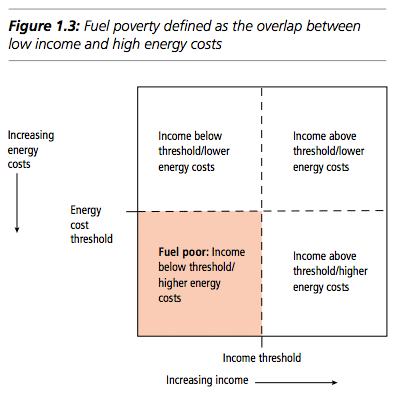Home > Energy > News > Government alleviates fuel poverty (by redefining it)
Government alleviates fuel poverty (by redefining it)
A simple, cheap Government measure will lift 6% of UK households out of fuel poverty come January: redefining the term.

Under the new definition, announced this week, households will only be classified as fuel poor if they are below the official poverty line and spend more than average on energy.
Since many smaller households spend less than the average, that will reduce UK fuel poverty to 11% of homes, the Environmental Audit Committee (EAC) calculates.
The EAC, a cross-party energy research group, said that the Government was "moving the goal posts" on fuel poverty.
Unless the Government can "demonstrate that it is committed to making fuel poverty a thing of the past" the redefinition should be scrapped, the committee's report said.
A Government commitment to eradicate fuel poverty by 2016 has also been scrapped recently and a reduction in energy bills for all homes, due to be announced soon, will be funded by withdrawing money from the Energy Companies Obligation (ECO) scheme which provides grants for insulation and boilers.
Although the energy companies run some help schemes of their own - Npower added £1 million to their crisis fund today, for example - it won't be enough to make up the difference.
Redefining poverty
The number of households in fuel poverty, according to the old definition, has been rising since 2004.
Households were previously classified as fuel poor if they needed to spend more than 10% of their income on energy bills to heat their home adequately.
However, the old definition wasn't perfect: for example, a Uswitch survey released in January this year found that seven in ten households reported going without heating to save money, suggesting that some are getting around high bills by not heating their home adequately at all.
According to research from the Poverty and Social Exclusion research project, the number of households that don't have enough heating to keep adequately warm rose from 3% to 9% between 1999 and 2012.
As energy prices rise, and look set to keep rising, it's also a measure that will start to include households that actually have quite high incomes, a characteristic that, the researchers argued, doesn't really get to the heart of the problem.
As a result, the Hills Fuel Poverty Review [pdf], written by Professor John Hills earlier this year, suggested a new definition.
To measure whether a household is fuel poor, the new definition looks at two things: the official poverty line and average fuel spending.
If a household spends more than average on fuel and, after that spending, is left with an income that puts them below the official poverty line, that household is fuel poor.
However, critics say, the new definition, which will be included in the Energy Bill currently making its way through Parliament and due to pass into law before the end of the year, was intended to be accompanied by a commitment to tackling fuel poverty.
That commitment seems lacking today and the fact that the new measure excludes many small low income households (the top left corner of the diagram below) doesn't help.

Source: Hills Fuel Poverty Review, 2012
Cold comfort
Cold homes are estimated to have resulted in around 10,000 deaths last year, according to official figures.
But it's anger over rising energy bills, record profits for energy companies and inadequate fixes for both, that are stirring Westminster to action.
The Government is getting ready to announce a £1,000 grant for energy efficiency improvements and a £50 reduction on fuel taxes.
To pay for it, the chancellor will pick the pocket of the Energy Companies Obligation (ECO) scheme.
ECO provides more efficient boilers and improvements such as loft and internal wall insulation to households in receipt of qualifying benefits; the money they have set aside for grants will now need to last for four years, rather than two.
Jonathan Reynolds, Labour's shadow Energy and Climate Change minister, criticised that trade off.
"David Cameron puts the interests of energy companies before ordinary people," he said.
Npower add £1m to crisis fund
Meanwhile, embattled energy firm Npower announced today that it will add another £1 million to its Health Through Warmth Scheme Crisis Fund, a grant scheme for households struggling with bills.
All the big energy firms run social schemes, mainly through a third party called Charis grants find out more here.
Npower remembered theirs after it was revealed this week that the company has the highest customer complaints level of the big six energy firms.
202.5 Npower customers in every 100,000 customers made a complaint in April, May and June this year.
In contract, SSE, which had the lowest level of complaints among the big six, had 38 complaints for every 100,000 customers.
A new billing system is to blame for the problems, Npower say, bringing to mind the TalkTalk, Tiscali merger which also resulted in huge billing failures, huge numbers of unhappy customers and, ultimately, huge fines for TalkTalk.
As well as the donation to the social fund, which is, we assume incidentally, the same size as the Npower Chief Executive's annual salary, the supplier will be writing to all customers to apologise for the problems.
Get insider tips and the latest offers in our newsletter

We are independent of all of the products and services we compare.

We order our comparison tables by price or feature and never by referral revenue.

We donate at least 5% of our profits to charity, and we aim to be climate positive.
Latest News

2 January 2024
Energy prices increase by 5%
23 November 2023
Energy price cap to rise 5% in January 2024
24 October 2023
Energy companies must do more to support customers

